- Home
- Johnny D. Boggs
Mojave Page 5
Mojave Read online
Page 5
“Where am I, Mister Clark?” Whip Watson yelled out.
“Thirty-one,” Mr. Clark answered.
“Thirty-two,” Whip Watson said, and the whip ripped at the cloth covering Conrad’s groin.
Funny. I’m what most folks call a pagan, an unholy lout, a backslider, but even after running away from the Sisters of Charity and running away from the law for quite a spell, all those years in that orphanage in Santa Fe had an effect on me. Out here in the Mojave Desert, surrounded by strangers, and watching a man whip another fellow to death with a whip meant for oxen, I could hear Sister Rocío reading Second Corinthians to us wayfaring, abandoned young’uns. So right then I prayed—I mean I prayed—that this punishment was “forty stripes less one.” And I hoped Conrad wouldn’t get beaten with rods and stoned after those thirty-nine lashes.
“Back in my youth,” Whip Watson said as he brought up the whip, “everybody bragged—only it wasn’t brag, but fact—that I could knock a horsefly off an ox’s ear without touching the ear.” He leaned back, smiling, focusing on Conrad’s exposed privates. “And the cajones on a cabrón?” The whip flew.
My head turned away.
“You watch this, damn you!” Whip Watson roared. “You watch, Mister Clark! All of you! Watch and learn!”
I spit out the gall rising from my gut, and somehow managed to turn back to the ugly scene. Wasn’t the only one who had looked away. Even Juan Pedro wasn’t smiling no more, but biting his lower lip and balling his hands into shaking fists. One fellow—no, it was two—had dropped to their knees and was heaving up last night’s supper and Tennessee sour mash.
Six stripes later, it all ended. Whip Watson began calmly coiling his whip, then picked up his hat. Nobody else moved, especially Conrad. By my reckoning, he had breathed his last after the thirty-fourth lash.
“All right.” Whip’s voice seemed calm as he adjusted the Boss of the Plains on his white hair. “No breakfast this morning.”
That meant one prayer got answered. I didn’t even want coffee. Nobody could eat after that scene, excepting, possibly, Whip Watson.
“Hitch the wagons, and let’s ride.”
The men departed, excepting Conrad, who had already departed this world. Standing like a lummox, I watched Whip Watson, now grinning, walk to me.
“How’d you sleep?” he asked.
“Oh.” Had to wait to make sure I wouldn’t vomit into my new boss’s face. “Fine. I reckon.”
“Good.” He stepped to his side, pointing at one of the Columbus carriages. “You’ll take Conrad’s buggy. You know how to hitch a team?”
“Yeah.”
“Good. Juan Pedro will tell you which horses are yours.”
I had been right about the livestock. Oxen pulled the Conestogas, big mules got hitched to the other wagons, except for one that got pulled by two bay Oldenburgs, and matched sets of fine horses were for the Columbus carriages.
My buggy had two short-legged Holsteins, brown, better than sixteen hands tall with deep girths and strong shoulders. Spent my time focusing on hitching the two geldings to the carriage, but every now and then I’d glance at one of the Conestogas. Didn’t see Jingfei. Didn’t spot nobody but Zeke and Mr. Clark as they busied themselves getting four ugly oxen into harness.
Beside me, a young whippersnapper who’d already hitched his two gray Percherons, pulled a rag from his pants pocket, opened a can setting on the front seat’s passenger floor, and dipped the rag in that can. He looked at me and said, “Better hurry, mister, get that leather buffed so you can see your reflection.”
Which is when I learned what a hard rock Whip Watson was for keeping his carriages clean.
Rubbing one of the Holsteins’ neck, I said, “But we’re in the middle of nowhere.”
The fellow was already scrubbing. Kept right on working that greasy rag, but he lifted his head. He had startling blue eyes, reddish hair, and a fuzzy mustache that you could probably wipe off without a razor. I doubted if he was out of his teens. I decided to name him Peach Fuzz.
“Don’t matter,” Peach Fuzz told me. The head dropped and he kept on working.
Which is what I was doing about ten minutes later when Whip Watson rode a black mare up beside my wagon. I glanced his way, seen the whip coiled around his saddle horn, and got busier buffing.
“That’s fine,” he told me. “Looks real fine. But let’s save some of that wax for later.” I stuck the rag in the can and closed the lid, staring up at my boss, and wiping the excess wax off my fingertips and on my trousers.
Juan Pedro galloped over. He rode a nice palomino mustang.
“We ready?” Whip asked.
“Sí, patrón.”
“All right.” Whip was leading his black behind my buggy, and I stepped back to see him tethering that fine animal to the late Conrad’s rig. “Go steady, but not slow. You know what to do, Juan Pedro.”
“Sí.”
“If anyone gets out of line, kill him.”
Juan Pedro grinned. He hooked a thumb toward the late Conrad’s corpse. “I think we will have no more problems of that nature, patrón.”
“I hope so.”
Three mule skinners brought four-five sacks from one of the farm wagons, and another had a big bladder of water. These got dropped on the back floor of my buggy which had once belonged to the late Conrad. The skinners weren’t thanked, weren’t dismissed, just did that chore and skedaddled.
Whip started to get into the carriage, but then he stepped back, back a right far piece, and he cupped his hands over his mouth and hollered, “You men!”
Didn’t take no time at all for all them men to finish what they was doing real quick to line up beside their wagons. I took a glance at the Conestogas, but Jingfei did not poke her head out of the canvas. Well, Whip had said, You men.
“That peckerwood”—Whip gestured wildly toward the late Conrad’s body—“was to have been paid two hundred dollars upon reaching Calico. Since he’s no longer with us, I will divide the wages I promised him among you. Two hundred dollars divided twenty-eight ways.”
Since there was no abacus in camp, I couldn’t quite figure that out—less than ten dollars for certain—and while it wouldn’t go far, these men, even Peach Fuzz, had probably killed men for less than that.
One guy called out, “Wouldn’t that be twenty-seven ? Since that pecker wood’s dead?”
Damned mathematicians.
With an ugly grin, Whip Watson extended a long arm and long finger right at me. “Micah Bishop has joined us,” he said. “He gets the same wages as all of you rowdies.”
Now, if you was to ask me, since Whip Watson had just killed Conrad, it would have made sense just to pay me the dead guy’s wages, and not provoke feelings of ill will among my fellow workers.
Whip grinned, and said to me and Juan Pedro: “That should keep them occupied.”
“How so?” asked Juan Pedro.
“Trying to figure out the difference between two hundred dollars divided by twenty-eight and two hundred dollars divided by twenty-seven.” Whip jutted his freshly shaved jaw at me. “That’s how much you just cost them.”
I didn’t bother trying to cipher that equation. It couldn’t be more than a few cents, but this crew appeared greedy.
“Get in,” Whip Watson said to me, and I was happy to oblige. “You drive.”
“Guttersnipe!” Climbing into the driver’s spot, I saw the fancy-silk-hat-wearing fellow step from behind one of the Conestogas. He pulled his hat off and made a beeline for my Columbus beauty.
Got me a better look at that tall dude with the beaded headband as he hurried our way, and then crawled into the seat right next to me. He had to duck to keep his head from poking through the canopy, and he had already removed his Abe Lincoln hat—though our late president never wore no headband quite as fancy as the one Guttersnipe had. I figured him to stand six-foot-five without the hat. He was shaped like a telegraph pole, just a regular string bean, hard as juniper and full of knots
. Had a thick brown mustache and goatee like the one on Buffalo Bill Cody’s chin. Wore a green evening frock coat with red velvet patches on the elbows and outer pockets, tall boots with mule-ear pulls, and two holsters on shell belts strapped across his waist. Since one Colt stuck out one way and the other Colt stuck out the other, I guessed him to be a left-hander.
He settled in beside me and said, “Name’s Guttersnipe Gary. But you can call me Guttersnipe Gary.”
“Micah Bishop,” I told him. “You can call me anything you fancy.”
He grunted, pulled a pouch of chewing tobacco from one of the green pockets, and stuffed one cheek.
“Drive over the body,” Whip Watson said from the backseat.
“What?”
“Drive over Conrad’s body.” His tone told me he wouldn’t answer any more questions.
It was a mean-spirited thing to do, but, well, I had seen my boss work that whip, and I figured he knew how to use his revolvers, and he was behind me and I never fancied getting shot in the back. I released the brake, clucked my tongue, and turned those Holsteins right toward camp.
They weren’t keen about the job, those fine horses, what with the blood all fresh and all, but they did it just the same. The carriage tilted a bit, but nobody was for the worser, and them high-stepping horses just went right along out of camp and into the desert with the sun on our backs.
“That’ll show them boys that I mean business,” Whip Watson said from behind me and Guttersnipe Gary.
To my way of thinking, whipping the clothes off one of the men, peeling off his flesh, then castrating him before he expired would have showed everybody his definition of business. But what did I know?
“Where we going?” I asked.
“Calico,” Whip answered.
CHAPTER SIX
A few days later, I got my first look at Calico.
Late morning, we come to a crudely painted sign that read:
WEL-COM 2 CALICO
QUEEN OF THE DESERT FLOWRS
Well, maybe if all the flowers in the desert had wilted and died and been blowed over with dust, then, maybe, just possibly, Calico could’ve been queen.
First folks we seen come scurrying down the trail that led to town, raising more dust than our Columbus carriage was forcing up. I eased the Holsteins to a stop, set the brake, and just stared. Four men, bearded, dirty, but with massive arms, come up pushing an empty wheelbarrow. “Welcome,” one of the fellows cried out, “welcome to Calico. Right this way, gents, to the Hyena House.”
Another one said, “Best hotel you’ll find in Calico.”
“Yes, sir, this here’s your bus,” the first one went on, motioning at the wheelbarrow, and he started to say more, but the third man poked him in his ribs with an elbow.
The fourth one spit a river of tobacco juice onto a beetle, which probably appreciated the moisture. He laughed like those proverbial hyenas.
The first fellow blinked, and stared, and blinked again.
“Why,” he said after the longest pause, “you ain’t the stagecoach.”
“But,” the second one said, “you still won’t find a better place to hang your hats than the Hyena House . . . gentlemen.”
I figured they’d all gotten the sunstroke. Right severely.
The fourth one shifted his quid of tobacco into another cheek.
“Drive on, Micah Bishop,” Whip Watson said, like he was the Prince of Wales, and I clucked my tongue and flicked the lines, and the Holsteins carried us past the four guys. A few minutes later, we rode right past the Hyena House. Wasn’t more than a cave in the canyon wall, though the four proprietors had built a wall of rocks out front. And the sign, painted the same color and probably by the same shaking hand as the sign welcoming us to Calico, hung above the cave’s opening.
I sure hoped that wasn’t the best lodging Calico had to offer.
Next, we passed lean-tos, and crudely built stone huts—no mortar—and dugouts, and, of course, caves. That’s where some folks lived, and then we looked off and seen the cemetery.
“Well, now,” Whip Watson said, “that boneyard reminds me of something, Micah Bishop.”
“What’s that?” I asked.
“Juan Pedro owes me ten dollars. You made it to Calico, and you ain’t dead.”
“Glad to be of your assistance,” I told him.
Guttersnipe Gary spit tobacco juice into the street, mighty careful not to get any on Whip Watson’s fabulous buggy, and a short while later we entered Calico proper.
Near as I could tell, the Queen of the Desert Flowers was a one-street town. Well, it was a long street, with high, barren hills off in the not too distant distance. I guessed that those were the Painted Hills I’d heard tell of. Painted, I said to myself, four shades of brown. Most of the mines lay beyond the town. I could see specks that was miners moving in and out of caves in those dark hills. Off to the south was a deep—and I mean deep—canyon. I reckon the only place you could put a town was where they put Calico.
Overall, however, Calico turned out to be not that bad of a burg.
I mean, we passed a couple of water wagons, so they had water here. Had to haul it from somewhere, and I don’t know where they found the wood to build some of the businesses. Certainly not in the hills. Only thing that could grow in this desert was rocks. But, yep, some of the buildings were wood frame, although about every third or fourth one was dirty brown, made of what they called “rammed-earth adobe,” which bared little resemblance to the adobe houses across New Mexico and Arizona territories. Reckon this was a California thing.
Miners and merchants walking along the boardwalks stopped to stare as I drove our Prince of Wales, Whip Watson, down the street.
“Where we going?” I asked.
His Highness said, “Just drive to the end of town, turn around, come back down. I want to get the lay of this place.”
Hell, there wasn’t much of a lay to Calico, but I was just the driver. Did some more tongue-clucking and more line-flipping, and the Holsteins kept high-stepping down the dusty street.
The lay of Calico, on the right side of the street, went something like this: More water wagons. A nicely built frame building with freshly painted (not even brown) wooden columns and a crowd of folks sitting on barrels and empty crates watching us go by. The sign, painted by someone who knowed what he was doing, read:
I S A A C N O E L
Dealer in
FINE WINES
LIQUORS
and
CIGARS
“That’ll be our first stop,” King Whip said.
Not much farther down the road, we passed a building, and the smells coming out of those windows made my stomach start growling because Guttersnipe Gary ain’t much of a cook, but there ain’t much anybody can do with hardtack, jerky, salt pork, and beans. Felt like a long time since I’d tasted Jingfei’s chow.
“And that,” King Whip said, “will be our second.”
I made a note in my mind to remember the Globe Chop House. Like I’d forget that place, or them smells.
On the opposite side of the street I spied a bridge, if you would call it that, that crossed the canyon, and there was more buildings that looked like dirt, and just caught a glimpse of someone running down into the canyon. Next to the bridge, on this side, stood a schoolhouse. Didn’t see no one in it, and now that it struck me, I hadn’t seen any kids anywhere in Calico.
Back on the right side of the street, there was more men in wool coats and black derbies who stared at us as we passed. On the other side, men in tattered clothes and thick beards stared.
We saw some more mines off behind the buildings, some privies, some holes, some narrow draws, a few smaller hills. Then we reached the end of town. Nothing beyond that but homes in holes in the rocks, decorated with barrel staves, and a crew of miners walking down a path like they was heading toward the gallows.
Guttersnipe Gary said, “Reckon that’s the way to the big mines.”
I said, “Reckon
so,” and got busy turning the team around.
“Stop,” Whip Watson said, and I stopped.
He leaned over and said, “That’s a nice building going up, ain’t it?”
We looked. We agreed. Seemed to be a two-story frame structure, with even fancier wooden columns than those outside of Noel’s watering hole. No glass yet, but two holes told me there would be two plate-glass windows on either side of some fancy doors. Six or seven carpenters kept busy pounding nails or sawing saws.
“That’ll be the palace of Calico,” Whip Watson said as he leaned back in his shiny leather seat.
“Beats the Hyena House,” I said, and clucked at the Holsteins.
This time, I focused mostly on that side of the street. A rammed-earth adobe that called itself a post office . . . a rough-hewn cabin that said it was a grocery . . . some buildings that looked like they’d been standing here since the time of Adam, and some new ones, and dirt ones, and dirtier ones.
“How old’s this mining camp, Whip?” Guttersnipe Gary asked.
“First strike was five-six years ago,” Whip answered.
We passed a pile of garbage where some dogs was digging, and a couple of men, too, in rags. The garbage wasn’t brown like most of the hills and most of the buildings. Mostly, I saw ash.
“Fire?” I said.
“Yep,” Whip Watson said. “That’s why some of the buildings look new. First fire swept through here back in eighty-three, I think it was. When they rebuilt, they made every third or so building be made of dirt, or adobe, or rocks. Something that would keep the fire from jumping from building to building.”
“Did it work?” Guttersnipe Gary asked.
“I guess,” Whip answered. “There was another fire the year after the big one, but it didn’t burn near as much. And you can see for yourself . . . this place is booming. Stop here.”
We wasn’t at Isaac Noel’s saloon, but I tugged on the lines and said, “Whoa,” and the Holsteins whoaed.

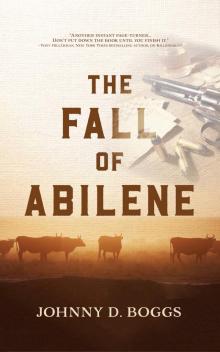 The Fall of Abilene
The Fall of Abilene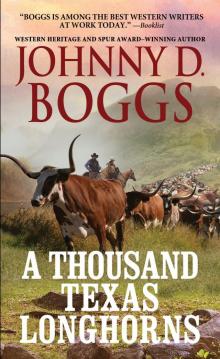 A Thousand Texas Longhorns
A Thousand Texas Longhorns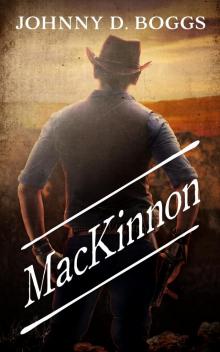 MacKinnon
MacKinnon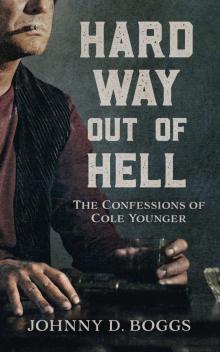 Hard Way Out of Hell
Hard Way Out of Hell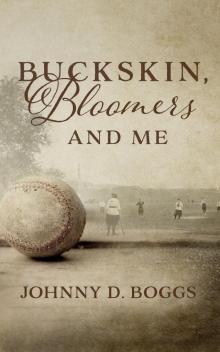 Buckskin, Bloomers, and Me
Buckskin, Bloomers, and Me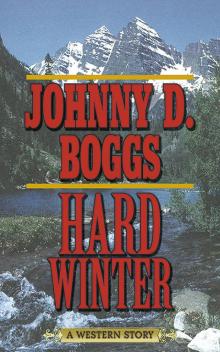 Hard Winter
Hard Winter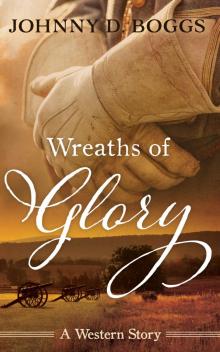 Wreaths of Glory
Wreaths of Glory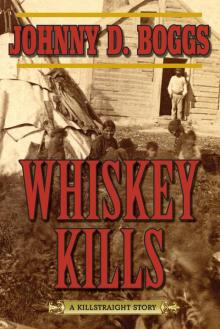 Whiskey Kills
Whiskey Kills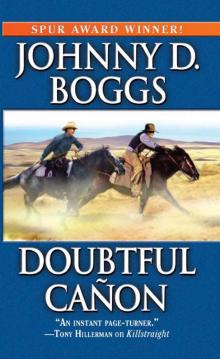 Doubtful Canon
Doubtful Canon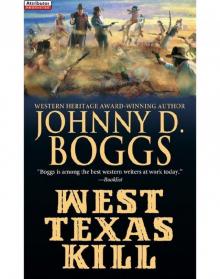 West Texas Kill
West Texas Kill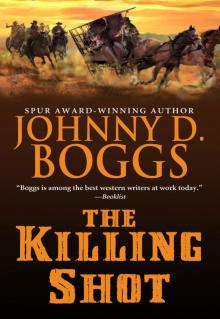 The Killing Shot
The Killing Shot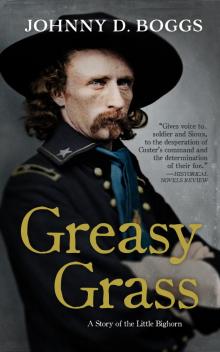 Greasy Grass
Greasy Grass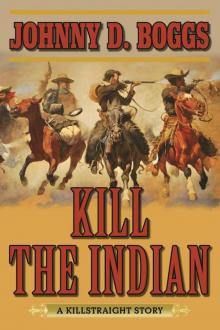 Kill the Indian
Kill the Indian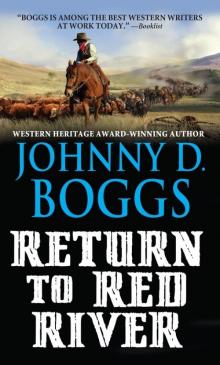 Return to Red River
Return to Red River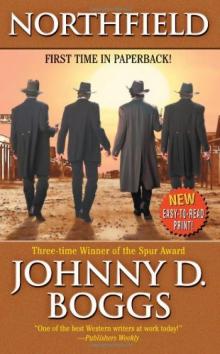 Northfield
Northfield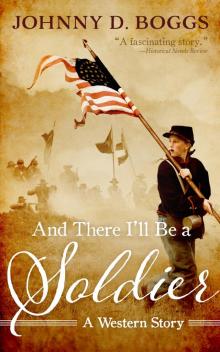 And There I’ll Be a Soldier
And There I’ll Be a Soldier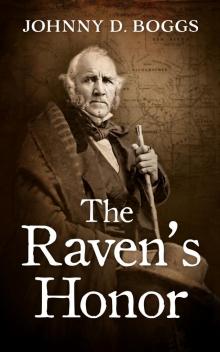 The Raven's Honor
The Raven's Honor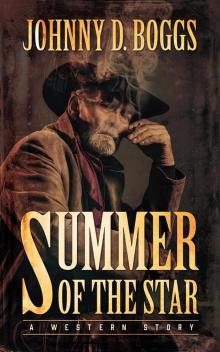 Summer of the Star
Summer of the Star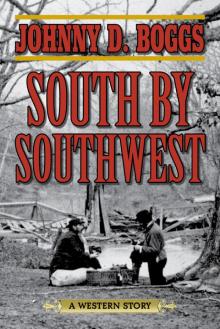 South by Southwest
South by Southwest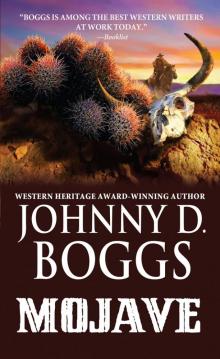 Mojave
Mojave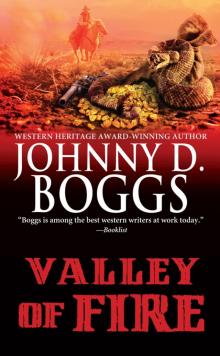 Valley of Fire
Valley of Fire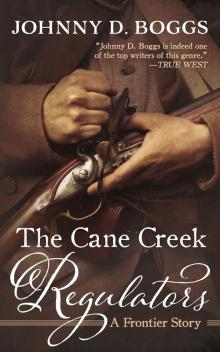 The Cane Creek Regulators
The Cane Creek Regulators